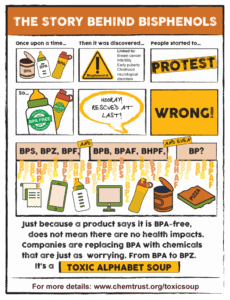Bisphenols

Bisphenol A is the building block of polycarbonate plastic – a hard clear plastic. Polycarbonate is used to make food and beverage containers, eye glasses, dental sealants and many other products. BPA is also used to make epoxy resins–which serve as protective linings on the inside of some canned foods and beverages, in the coating on thermal receipts, and in other applications. BPA is part of a larger class of bisphenol chemicals.
How am I exposed?
People are exposed to bisphenol A when the chemical leaches into food, formula, and water from cans, baby bottles, water bottles, or other polycarbonate plastic containers. Bisphenol A in household dust may be another source of exposure. People are exposed from bisphenol A-containing dental materials or from the coatings on thermal paper, which is used in cash register receipts, ATM slips, and labels attached to take out food.
Why should I be concerned?
Bisphenol A is a hormone disrupting chemical that has been shown to have a variety of health effects at low doses. Industry has begun to move away from BPA, but the substitute bisphenols (e.g. BPS) have also been shown to be endocrine disrupting chemicals.
What can government and business do?
State and federal governments should take immediate action to end the use of bisphenols in baby bottles, infant formula cans, sports water bottles, and food and beverage cans.
Makers of products containing bisphenols, especially baby bottles, sports water bottles, infant formula cans, and food and beverage cans, should phase out their use of the chemical in favor of safer alternatives.
What is being done in Massachusetts?
In 2010 the Massachusetts Department of Public Health banned BPA in baby bottles and sippy cups following a campaign by the Alliance for a Healthy Tomorrow.
How can I reduce my exposure?
- Choose alternatives to polycarbonate plastic* for baby bottles, sports water bottles, and food containers. For babies, glass and cloudy plastic bottles are better choices. For sports bottles, the best choice is stainless steel.
- Choose powdered rather than liquid infant formula. If you do need liquid formula, use bisphenol A-free containers.
- Limit your intake of canned foods and beverages. For some canned foods, bisphenol A – free cans are available.**
- Do not heat your food in plastic containers;
- Throw away damaged plastic kitchen ware (including hard clear plastic glasses or bottles filled with hairline cracks);
- Buy fresh or frozen foods instead of canned;
- When getting dental fillings, ask for “composite” rather than “resin” or “amalgam” fillings. Resin fillings contain BPA and amalgam contains mercury;
- Skip getting a receipt at the store, gas station or ATM. Receipts and other thermal papers (which may be used in labels) are often treated with bisphenols.
* Polycarbonate plastic bottles and containers are labeled with a “7” inside a recycling symbol with the letters “PC” (for polycarbonate) or “OTHER” beneath. Note that not every plastic labeled with 7 and “OTHER” is polycarbonate.
**IMPORTANT: just because a product is labeled “BPA free” does not necessarily mean that it is non-toxic! Always ask what the product is made of and whether that material is linked to negative health impacts.
As researchers have raised the alarm about BPA, industry has moved to other bisphenols, such as BPS, which also are shown to be endocrine disrupters.
Read here for additional detail about other bisphenols that have endocrine disrupting properties.
Additional Resources
National Institute of Environmental Health Sciences: Bisphenol A (BPA)
Breast Cancer Prevention Partners: The State of the Evidence on Bisphenol A (BPA)
Toxic Free Future provided content for this page.
